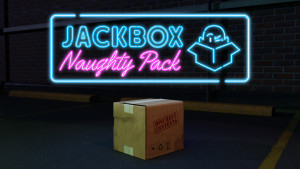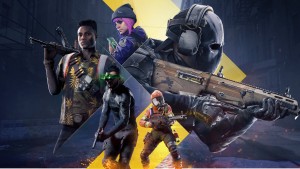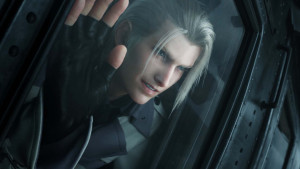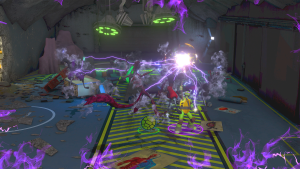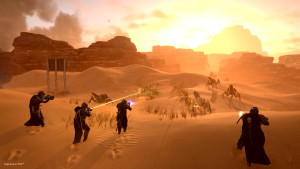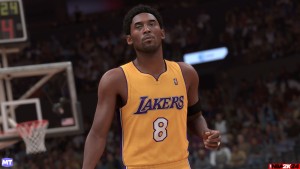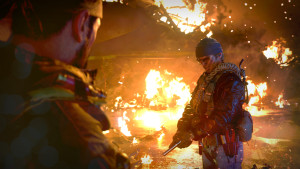Please support Game Informer. Print magazine subscriptions are less than $2 per issue
The Zen Of Twisted Pixel: An Interview With Michael Wilford
![]()
[Photo by Lance Rosenfield]
Twisted Pixel Games is a tight-knit studio in Austin founded by ex-High Voltage developers Michael Wilford, Josh Bear, and Frank Wilson. The studio is known for humorous, challenging XBLA games like The Maw, Splosion Man, and the upcoming retail Kinect game, The Gunstringer. We recently spoke with CEO Michael Wilford about the company’s unique story, development philosophy, and view of the game industry.
You worked at High Voltage, which is known more for licensed products and porting. How did that experience inform your vision for Twisted Pixel?
It’s really important, because High Voltage generally have a reputation for turning out games pretty quickly and doing a lot of licensed stuff….While I was there the teams were small for what they were trying to do and didn’t have as much time or as much money as we would have liked. Ultimately, what that taught all of us – and we have several people from High Voltage – was being able to make something on a shoestring budget with no time and not many people. That’s a valuable skill to have when you’re making downloadable games.
Right from the beginning, it sounds like you targeted Xbox Live Arcade. Would your company even be possible without XBLA and those type of services?
Definitely not. If XBLA hadn’t happened, I don’t think there would have been WiiWare or PlayStation Network – or they certainly wouldn’t be as important as they are now. If we would have waited a few years and done something on mobile – iPhone has broken down a lot of doors for developers – maybe that would have worked. But in 2006, without XBLA, we would have been screwed. It was part of our plan. In 2005, when Xbox 360 came out, we found out about Live Arcade and what it could do, that’s specifically what we set out to do.
We were getting nowhere fast with Microsoft in the early days, but Nintendo was eager to talk to us. Back then, WiiWare was planned to be more like Xbox Live Arcade, where it’s curated and developers have to submit to Nintendo. Twisted Pixel was the first company to get a green light for WiiWare. We had a game concept that we still hope to do someday, so I don’t want to tell you too much about it – but we pitched a game to Nintendo that they really liked.
So what happened with that project?
A month after that green light, we get the call from Nintendo saying, “Yeah, Nintendo of Japan decided to go this route, so your green light doesn’t really matter anymore. Essentially everyone is greenlit now.” If we had Nintendo’s backing and support for WiiWare, that would make it a lot easier to get funding. But now that it was that different model, we weren’t willing to jump in. So we went back to the drawing board and started making pitches to Microsoft. It was GDC of 2007 when I met with David Edery, who was the games portfolio planner for XBLA at the time. I threw out three concepts, one of them was The Maw, and he pointed to it and said, “I think that would be awesome.” So I went back to the guys and said, “I think we got a green light.”
![]()
Some developers – especially on the indie game side of Xbox Live – have said it’s a hard place to make money. Have you been satisfied with the business side of Xbox Live?
Live Arcade [has] changed a lot since it first launched. There are a lot more games and it’s more hit driven. That’s what happens when any new and romanticized platform comes out – iPhone was the same thing, or Facebook games. There’s the “morning” period where everyone’s unsure about how successful it will be. Then there’s the period after that where it does really well and there’s a gold rush. Then after the gold rush, it starts to become way more hit driven. The dream of the “long tail” where anyone can make some kind of small, niche product and make a bunch of money over a long period of time isn’t proving out to be as accurate as people originally speculated. Really, there are a small percentage of games on iPhone or XBLA that come out and do well. The rest of them are several orders of magnitude less successful. Marketing and getting buzz around your game is very important. If you don’t have that, you’re dead in the water.
You had a feud with Capcom over MaXsplosion, a game that was a carbon copy of Splosion Man.
We didn’t know anything about it. One day our audio guy, Chainsaw, sent us an email saying, “This game MaxSplosion came out and everyone is saying it’s a ripoff of Splosion Man.” We started looking into it and were like, “Holy crap, this game does seem pretty similar.”
The way it went down was…we did pitch Splosion Man to Capcom. It was guys we know at Capcom USA. They don’t work there anymore, but they are buddies of ours. When we pitched them, they had their own legitimate reasons why they didn’t want it at the time in terms of their XBLA and PSN plans. So they passed on it. From there, I have no idea where pitches go; if it gets circulated around Capcom and someone sees it and says, “That’s a cool idea and we should rip it off.” I’m guessing that didn’t happen. It’s Capcom UK that does their mobile stuff. If I had to guess it was probably a completely different, independent team of guys that decided to make something that they thought would be successful for iPhone. I definitely talked to the guys that I know at Capcom USA, who had nothing to do with it. They were more shocked and more pissed than I was.
You seem to have a real affection for humor and slapstick comedy. What are some of your inspirations, and how did you decide to go that route instead of the dark, edgy atmosphere that so many games have?
We wanted to be focused on character and personality. When we were growing up there were games like Mario and Sonic and Earthworm Jim and games with iconic mascots we’ll all remember until the day we die. I don’t think that’s happening anymore. We wanted to bring back these memorable characters. As we do that, because of our sense of humor and who we are, we find a lot of ways to get humor in the games. We prefer to be silly rather than take ourselves too seriously.
The Gunstringer is coming out as a retail Kinect game. Was that something you sought out or an opportunity that arose?
It was definitely something that arose. Gunstringer was originally supposed to come out on XBLA earlier this year. Around that time, Microsoft did a retreat where all the executives all went off to someplace. The entertainment was supposed to be Gunstringer and some other games for them [to play] after the meetings. Don Mattrick and Phil Spencer were playing the game and loved it. One thing led to another and [Microsoft] asked us if we wanted to take the game to retail. We were excited about it. One thing we constantly run up against when we’re making games is getting to the end and realizing that the game could be so much better if we just had a little more time and money. That’s basically what we were able to do with Gunstringer.
Was the game conceived for Kinect or did you transition it to Kinect?
One idea [we’d] been talking about was a puppeteering game. There was no main character or anything at that point. Before it was Kinect, Microsoft invited us to a summit where we could see the Project Natal tech. Once we learned what we could do, we immediately thought about the puppet game we’d always been talking about.
The funny part was that we were having dinner with Microsoft right after we were done at the Natal summit. We were at this restaurant called The Matador in Redmond. Microsoft took us there. They all went to the bathroom at the same time, so me and [Twisted Pixel CC] Josh Bear were sitting there by ourselves. We said, “We have to pitch them this puppeteering game right now, but we don’t have a character yet.” We’re looking around, and above the bar there was this cool painting of the Old West style skeleton. I said, “Do you want to pitch that?” and he said, “Cool, let’s go with that.” When they came back to the table, Josh said, “So the idea we’ve had for a long time is this gunslinger marionette undead puppet.” They totally bought into it; they thought we’d been working on it for a long time. [Laughs]
Click here to read our review of The Gunstringer




